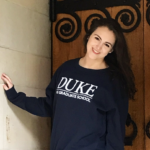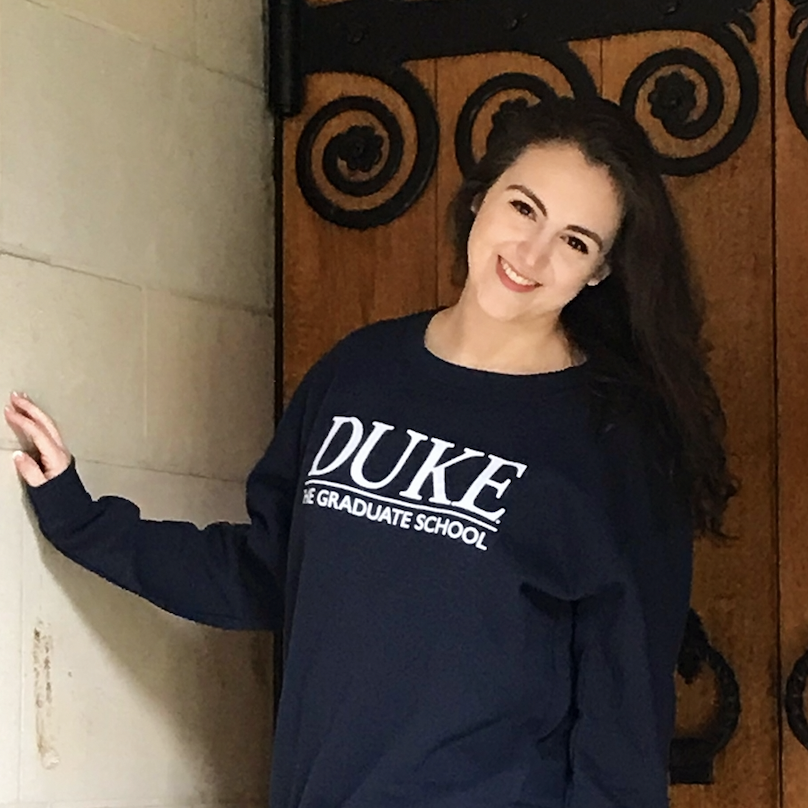We’re taking time to get to know the members of the GSA’s Early Career Scientist Committees. Join us to learn more about our 2021 early career scientist advocates.

Rachel Meade
Communication and Outreach Subcommittee
Duke University
Research Interest
In the midst of the SARS-CoV-2 pandemic, it is easy to forget that a much older and more dangerous pathogen continues to take millions of lives per year. One-quarter of the world population is thought to be latently infected with Mycobacterium tuberculosis (Mtb), the causative agent of tuberculosis (TB), and many factors play a role in determining how fatal these infections become. My research focuses on genetic variation in both the host and the bacterium as a predictor of disease outcome.
Just as many COVID patients experienced only mild symptoms while some had much more dire prognoses, the symptomatic results of Mtb infection exist along a spectrum that is highly dependent on both the strength and efficiency of the patient immune response and upon the genetic tools, or virulence factors, possessed by the invading bacteria. To explore the many ways in which variation between unique individuals can predict the TB disease outcome, I study genetically diverse mice including well-known inbred lines, recombinant inbred panels (BXD, Collaborative Cross), and outbred panels (Diversity Outbred), which together encapsulate even greater SNP-level diversity than is present in the human population. By infecting these mice with Mtb and comparing their immune response to their genomes, we can identify genetic loci that are strongly linked to susceptibility and clinical traits, such as inflammation, weight loss, and mortality.
However, the story of TB susceptibility goes beyond the genetics of the host, as some Mtb strains have historically proven to be much more dangerous than others. As an obligate human pathogen, each Mtb strain arrives in the lungs of a host with a unique set of genetic tools that enable their survival by allowing them to scavenge nutrients, hijack host immunological defenses, and nestle into host immune cells, often waiting until the host becomes immunocompromised to launch an attack.
To study which genetic tools are most essential for Mtb to accomplish its goals, I use a library of Mtb transposon mutants (TnSeq), compromised of single knockouts of each Mtb gene that is non-essential in vitro. By tracking which single knockout mutants can survive within a host, I can articulate which Mtb genes are needed for bacterial survival in vivo.
By combining diverse hosts with diverse pathogens, I hope to define novel host-pathogen interactions that govern the TB clinical outcome, which will ultimately enable the design of therapeutic strategies to treat a pathogen currently impacting nearly a quarter of the world today.
As a PhD-trained scientist, you have many career options. What interests you the most?
Before my PhD training, I primarily used wet lab approaches to study endogenous human disease, namely breast and prostate cancer. The pandemic shutdown at Duke, which occurred just two months after my graduate lab opened, offered me the opportunity to expand my dry lab expertise, which I enjoyed more than I ever expected. Additionally, computational approaches have allowed me to directly analyze the intersection of host and pathogen diversity in a way that truly excites me. For these reasons, although I am relatively early in my academic career, I can imagine myself pursuing a career in industry as a data scientist, which will allow me to ask complex scientific questions of ever-growing data structures. That said, I would be interested in pursuing a data-oriented career specifically within the field of human health, genetics, and infectious disease.
Beyond data science, I look forward to expanding my wet lab skills in the biosafety level-3 (BSL-3) environment necessary for work with Mtb. Because Mtb is a biohazardous human pathogen, I am required to wear a respirator that protects me from infection while I work. Moreover, there are numerous precautions that I must take to infect mice, culture Mtb, and dispose of infected waste in a safe manner. Additionally, I am trained to respond to emergency situations calmly and judiciously in the BSL-3 laboratory, such as pathogen spills or puncturing of gloves and protective equipment. These skills will enable me to pursue my other career interests, which include drug research and development and academic infectious disease research. I am exploring these unique career paths by attending career development workshops, developing relevant skills, speaking to Duke alumni, and reading some amazing literature. My book recommendation for anyone thinking of a career in biomedical science is Career Opportunities in Biotechnology and Drug Development by Toby Freedman, Ph.D. This book explores a breadth of potential careers for biomedical graduates including and beyond benchwork, offering pros, cons, and skills and traits that would help someone excel in each position. Ultimately, I am interested in an engaging career that will challenge my critical thinking and drive within a supportive and flexible environment.
In addition to your research, how do you want to advance the scientific enterprise?
In the past few years, it has become apparent that the speed of misinformation far exceeds the speed of the facts. Moreover, it has become clear that the impacts of misinformation disproportionately impact historically oppressed and disadvantaged groups. The CDC estimates that Native Americans, Hispanic Americans, and African Americans are two to three times more likely to die of COVID-19 than white Americans, and misinformation spread by individuals of varying levels of authority has played a large role in fueling COVID-19 vaccine hesitancy, perpetuating this vicious cycle. The irony of scientific reporting today can be summed up by an article entitled “The growing inaccessibility of science”, which exists behind a $200 subscription paywall. Despite the fact that federally-funded research is funded by citizens, a large proportion of scientific literature is either conceptually, physically, or financially inaccessible to the public. It is therefore no wonder that science literacy among the public has dwindled. It is essential that modern scientists not only pursue open access publishing but also communicate their own work accessibly to the public, utilizing social media and other media outlets as tools to limit opportunities for misinterpretation and abuse of the information they report.
Throughout my scientific career, I plan to fight misinformation by sharing informed and approachable interpretations of my own work on open access platforms. I aim to be among a new generation of scientists that take a proactive, rather than reactive, stance against misinformation through science communication and outreach initiatives that target communities with the least access to scientific resources. In this way, I hope to facilitate the accessibility of science and STEM careers to younger audiences and to assist the public in seeking out reliable and useful sources for their own scientific inquiries. For now, I do this through hosting Skype a Scientist sessions, in which I explain my research to K-12 students and offer Q&A sessions about what being a scientist and pursuing a career in research entails. Additionally, I volunteer for community education initiatives, such as DNA Day, to communicate lessons in genetics to local elementary students. Through my written work and community-based initiatives, I hope to improve scientific literacy and accessibility amongst the public.
As a leader within the Genetics Society of America, what do you hope to accomplish?
I am primarily interested in increasing public comprehension of genetics while expanding mentorship initiatives within GSA. I seek to engender an atmosphere in research that works toward the advancement of science and society in a way that is accessible to non-scientists. I envision a future in which GSA communications include a generalized summary targeted toward non-scientists, bridging the gap between researchers and the ultimate beneficiaries of their work. I see my role in the Communication & Outreach Subcommittee as a concrete path to the realization of this goal.
Furthermore, as the daughter of a U.S. immigrant, I aim to prioritize mentorship and inclusion of historically excluded communities in genetics by increasing visibility of mentorship programs to the GSA. As part of my work with this subcommittee, I will seek ways to serve as a mentor to younger GSA members and to make all GSA members aware of the opportunities to offer direct or indirect mentorship to students of a range of backgrounds. Through the external initiative of literary accessibility and the internal initiative of mentorship visibility, I intend to build upon the foundations laid by former members of the GSA ECLP to improve the greater genetics community.
Previous leadership experience
- Duke Graduate & Professional Student Government, Genetics & Genomics Program Representative
- Duke BioCoRE Professional Development Subcommittee, Member
- Científico Latino Graduate Student Mentorship Initiative, Mentor
- UT Dallas SACSCOC Quality Enhancement Project, McDermott Chair & Student Representative
- Alpha Phi Omega National Service Fraternity, AEZ Chapter Executive Member































